- Study abroad
- Hibiki NAKAGAWA
Hibiki NAKAGAWA
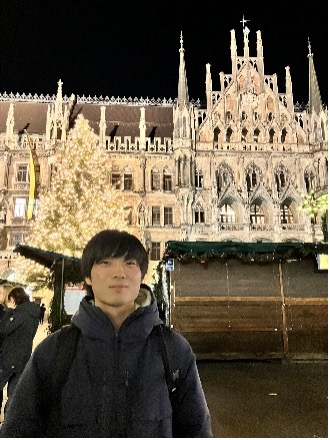
- Posted
- Fri, 10 Jan 2025
Hibiki NAKAGAWA | 1st year master’s student, School of Fundamental Science and Engineering
- Visiting period: Sep. 2024 to Dec 2024
- Visiting university: Technical University of Munich
- Visiting country and region: Germany, Munich
I have been interested in studying abroad since my undergraduate years. However, due to the impact of COVID-19 and financial concerns, I had not been able to study abroad until now.
As I progressed in my research, I began doing research with exchanged students, which gave me more opportunities to use English. This experience strengthened my desire to take on new challenges abroad.
At that time, I knew about the Super Global University (SGU) program. I was sure that this experience would contribute significantly to my personal and academic growth and decided to apply for the overseas exchange opportunity.
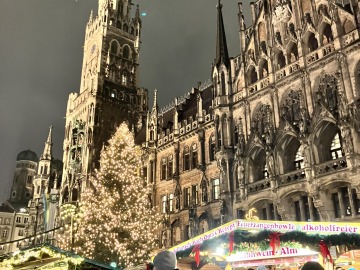
ミュンヘンのランドマーク
In Japan, I am doing research on the development and control of inflatable robots. By combining this 2-meter-tall robot with a soft hand driven by pneumatic actuators, I aim to create a more flexible and safe soft robotic system. However, the inherent nonlinearity of soft robots causes challenges in achieving precise motion and accurate position control.
To address these, I worked on motion generation for soft hands of object grasping using deep predictive learning. Specifically, I began by designing and developing a new soft hand, establishing a control system using pneumatic actuators, and integrating sensors such as pressure sensors, FSR sensors, and flex sensors. Using this system, I collected data on grasping objects of various shapes and materials, and recorded sensor data and the valve states of the pneumatic actuators. Based on this data, I developed a model that learns how to control the timing and force required for stable object grasping.
At last, I confirmed that the deep predictive learning model enables the soft hand to generate proper grasping motions with the appropriate timing and force for each object.
However, challenges remain, such as the difficulty of obtaining reliable sensor information due to the flexibility of the soft hand and the low reproducibility of movements caused by the hysteresis characteristic of pneumatic actuation. To overcome these issues, I plan to continue collaborating with my colleagues, aiming to improve the system’s accuracy and consistency.
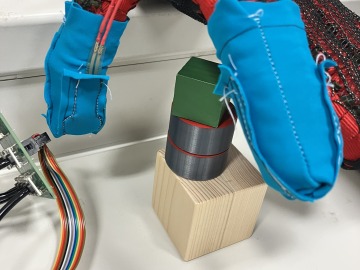
研究で使用したハンド
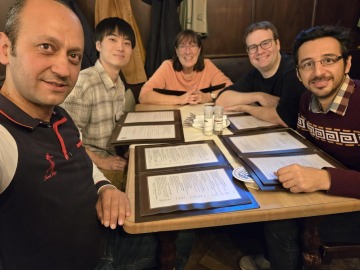
研究室のメンバーと
International Exchange
At the lab, there are so many researchers from various countries, including Germany, Syria, South Korea, China, France, Argentina, and Spain to conduct their research. We often went to the cafeteria, known as the Mensa. And we enjoyed the lunch and conversations together. The opportunity to interact with researchers from such diverse backgrounds was an incredibly valuable experience. During the Christmas party held at the lab, we had the chance to try traditional German dishes and enjoy board games together.
In Germany, there are strict laws regulating work on Sundays, and people often take extended breaks during the Christmas holidays to spend time with their families. This clear distinction between work and leisure created a well-balanced lifestyle. Experiencing these cultural habits, which are uncommon in Japan, gave me a renewed appreciation for the importance of maintaining a healthy work-life balance.
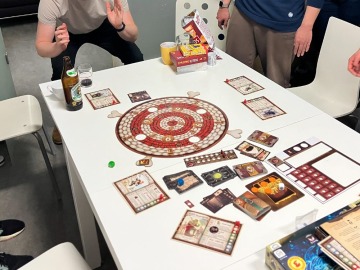
クリスマスパーティーにて
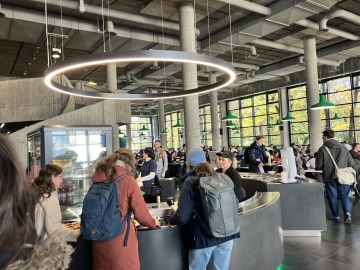
メンザ
Residential Environment
I stayed in three different Airbnb accommodations.
My experiences ranged from living in a rural area, about 1.5 hours from central Munich, to staying in a more urban setting just 30 minutes from the lab. This allowed me to catch a glimpse of the diverse lifestyles of people living in Germany, which was very fascinating. Notably, two out of the three accommodations had dogs. In Germany, it’s common to see dogs riding trains and buses—they’re quiet, friendly, and an integral part of daily life, bringing a sense of warmth and comfort.
At my third accommodation, on my last weekend in Germany, the host treated me to a traditional German homemade meal. It was a wonderful experience to enjoy the flavors of a home-cooked dish that you wouldn’t typically find at a restaurant, leaving me with a heartfelt sense of connection and warmth.
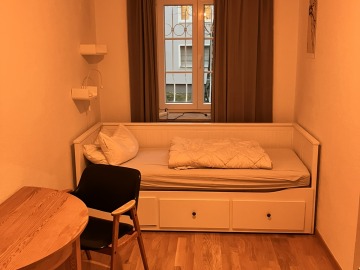
宿の自室
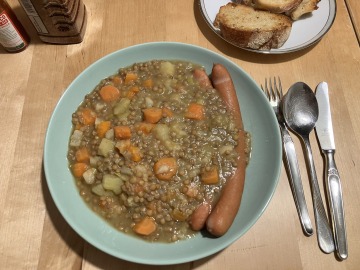
ホストの方にふるまっていただいたドイツの家庭料理
Surrounding Environment
I experienced two of Germany’s iconic cultural events: Oktoberfest and the Christmas Market.
And I went to soccer games several times. Soccer is very popular in Germany, and on match days, people of all ages and genders come together to watch the games. Especially in Munich, there’s a strong team, FC Bayern Munich. As someone who has played soccer since childhood, I was extremely thrilled to attend and watch the game with an incredible atmosphere firsthand.
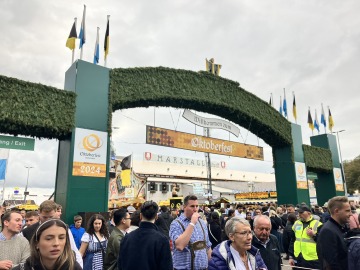
オクトーバーフェスト
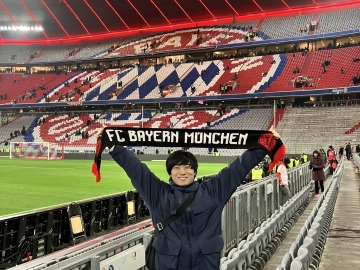
FCバイエルミュンヘンの試合
Future Goals After Overseas Experience and Conclusion
The interactions I had with students and researchers at the lab, as well as with friends I met while traveling, were incredibly inspiring and broadened my perspective.
In my future research activities and career, I aim to contribute and thrive on a global stage while actively interacting with people from different fields and backgrounds.
I would like to express my heartfelt gratitude for all the support I have received.
I am deeply thankful to everyone involved in the SGU program for their assistance with procedures and financial support, to Prof. Ogata and the members of our laboratory for their program support, and to everyone at the research lab who supported my research activities on-site.
